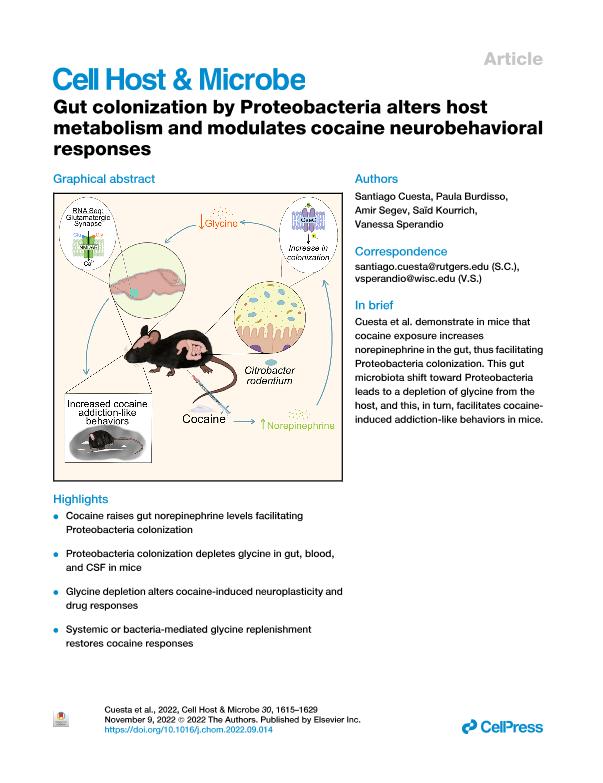Artículo
Gut colonization by Proteobacteria alters host metabolism and modulates cocaine neurobehavioral responses
Fecha de publicación:
11/2022
Editorial:
Cell Press
Revista:
Cell Host & Microbe
ISSN:
1931-3128
Idioma:
Inglés
Tipo de recurso:
Artículo publicado
Clasificación temática:
Resumen
Gut-microbiota membership is associated with diverse neuropsychological outcomes, including substance use disorders (SUDs). Here, we use mice colonized with Citrobacter rodentium or the human γ-Proteobacteria commensal Escherichia coli HS as a model to examine the mechanistic interactions between gut microbes and host responses to cocaine. We find that cocaine exposure increases intestinal norepinephrine levels that are sensed through the bacterial adrenergic receptor QseC to promote intestinal colonization of γ-Proteobacteria. Colonized mice show enhanced host cocaine-induced behaviors. The neuroactive metabolite glycine, a bacterial nitrogen source, is depleted in the gut and cerebrospinal fluid of colonized mice. Systemic glycine repletion reversed, and γ-Proteobacteria mutated for glycine uptake did not alter the host response to cocaine. γ-Proteobacteria modulated glycine levels are linked to cocaine-induced transcriptional plasticity in the nucleus accumbens through glutamatergic transmission. The mechanism outline here could potentially be exploited to modulate reward-related brain circuits that contribute to SUDs.
Archivos asociados
Licencia
Identificadores
Colecciones
Articulos(IBR)
Articulos de INST.DE BIOLOGIA MOLECULAR Y CELULAR DE ROSARIO
Articulos de INST.DE BIOLOGIA MOLECULAR Y CELULAR DE ROSARIO
Citación
Cuesta, Santiago; Burdisso, Paula; Segev, Amir; Kourrich, Saïd; Sperandio, Vanessa; Gut colonization by Proteobacteria alters host metabolism and modulates cocaine neurobehavioral responses; Cell Press; Cell Host & Microbe; 30; 11; 11-2022; 1615-1629.e5
Compartir
Altmétricas




